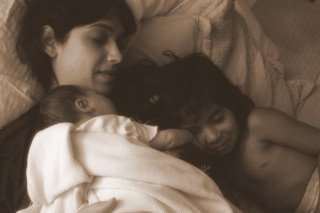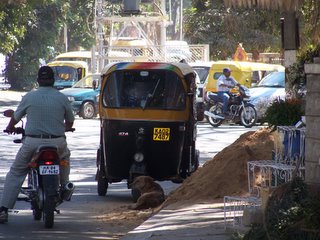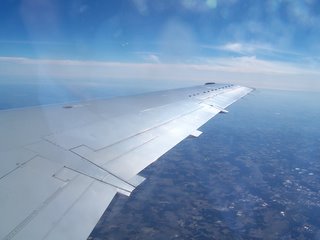After work, we go and look at carpets. I’ve set this up of course before hand with a colleague who knows what I am looking for, and though it is a perfectly normal endeavor to undertake, it feels nonetheless incredibly elitist. We see many carpets, silk and wool, hand-woven, and, to me, of reasonable expense. It seems logical to pay five or six thousand dollars for one of these fine pieces. We are offered tea. I decline, but only because I have had a gallon of tea already, and a gallon of coffee, and I feel I am already faring the worse for it. I am losing my voice and gaining a cough. It is a pleasant experience to see the hard work of one or two families gain such a price (but they are no doubt worth much more: 10 years of man hours in effect bubbles up only to twenty thousand US or so).
Afterwards, our driver takes us to Cunningham Road where there is more shopping and the crushing blow of humanity unabated, even on a Monday after hours (which is still the US Sabbath). Our driver parks in a secluded spot and we walk a few blocks into the core of the market area. It is almost impossible to not step into the path of an oncoming truck or motorcycle and yet at our feet are small children hibernating or weaving necklaces of flowers. It is an amazing mix of horse and cow, man and woman, child and smaller child.
I nod off in the car on the way back. I am unsure of the team either here or there, and note only my fatigue which is, at once very distinct. I am losing my voice and begin to feel completely drained.
At the Oberoi, a man in a Gurkha uniform opens the door for me. I take a spin at the bar with a book and a clean notepad or two. The bar is called the Polo Club and it is done up in dark greens and all sorts of Anglo-isms (pictures of locals in black and white, and random artifacts from Colonial times) which normally I would mind and find offensive, but in this case, I find them oddly un-ironic. I order pints of Kingfishers and watch India versus Zimbabwe in cricket. The game is weeks, perhaps months old now, but it still holds my attention.
My bartender, Sreeram, charges his cellular phone on the bar. His boss, a very dark Indian stares at him and chastises him in front of me: “In front of the customers?” he says to Sreeram. “Move it,” he says. There are Brits at the bar, one in a suit, and they are drinking lagers. I believe that they are bankers from HSBC and they smoke Marlboros and tell jokes. Sreeram moves his phone (with a fashionable designer case) below the bar next to the ice chest where I cannot see it. It is ironic to me that Sreeram is so badly chastised by his manager, the man who forgot to bring me a menu, and it occurs to me that the reason Sreeram was charging his phone where I could see it was just so that I, and everyone else, could in fact,
see it.
I am joined on my side of the bar by Americans, here for the same reason as me. I listen to them discuss their work for a time, but find it boring and depressing. The Brits leave and the cricket highlights turn into, of all things, badminton highlights, mixed doubles.
I find my ideas, my preconceived notions of large families from years ago, of dynasties really, are still with me, and they still very much shape my world view. I can see now our family as a large one, possessed of large quarts of ice cream and many bags of fireworks, skis, skateboards, our children and our children’s friends nodding off still in sandy, wet swimsuits exhausted from time at the beach or the pool or the club, struggling to right themselves during a long trip in the back of the Disco, holding hands together maybe or holding books they can no longer see to read in the darkness.
I am relieved and excited when Sreeram, cleaning out his refrigerator, reveals a number of Guinness and I have two before I realize they are ten dollars each; I want a Clannagh tattoo desperately even though I am at most one quarter Irish.


 This was 1977 of course, when Narayan was writing, before the advent of the autorickshaw which is by far the most prevalent vehicle on the streets of Bangalore. 75,000 of these or so are registered with the city government, but estimates of actual numbers on the streets range into the multiple hundreds of thousands. This was 1977, when the population of Bangalore was just over two million, while today it is greater than six million.
This was 1977 of course, when Narayan was writing, before the advent of the autorickshaw which is by far the most prevalent vehicle on the streets of Bangalore. 75,000 of these or so are registered with the city government, but estimates of actual numbers on the streets range into the multiple hundreds of thousands. This was 1977, when the population of Bangalore was just over two million, while today it is greater than six million.